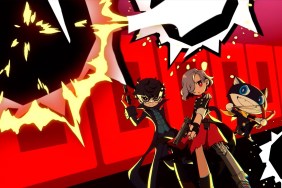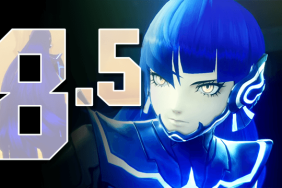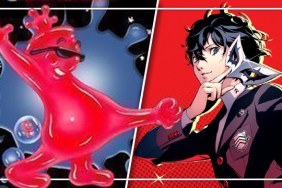Apocalypse Wow.
The first time I picked up a Shin Megami Tensei game, a flood of emotions swept over me. First there was awe and admiration for Shin Megami Tensei: Nocturne’s striking art design. Then, curiosity over the combat system’s many unique takes on RPG tropes. And finally, a shattered controller slick wet with tears as I hate-cried the game out of my Playstation 2. With a difficulty as demonic as its source material, the Shin Megami Tensei series was out of my gaming life forever. Until Shin Megami Tensei IV: Apocalypse sweet-talked its way into my pocket, that is.
The latest in the long-running series is a semi-sequel to 2013’s Shin Megami Tensei IV. Part alternate history, part American Gods as written by Joss Whedon, Apocalypse tells its story through the eyes of the Hunters—humans living in the ruins of Tokyo. Affectionately referred to as “Nanashi”—literally, “No Name”—you learn the ropes of being a Hunter and soon find yourself embroiled in a world-ending war between gods and demons. Deemed “Godslayer” by your new demonic companion, you will recruit demons and angels alike to tip the scales in humanity’s favor. Those who have played the previous SMTIV will have a leg up on some of the plot details, but the story is very welcoming to newcomers. Players worried about having their butts handed to them can toggle the difficulty on the fly—a feature worth its weight in broken controllers.
With demons running the show above ground, the only safe havens for humans are underground. Going above ground means going toe-to-toe with Lucifer’s finest, a frightening endeavor were it not for your Hunter training. Combat in Apocalypse is fairly straightforward, with a few quirks the series is known for. Referred to as the Press Turn system, fighting is all about exploiting weaknesses. Using an enemy’s weakness to Fire, for example, snags you an extra turn. However, if an enemy attacks your weakness, you lose a turn. This back and forth makes an otherwise simple JRPG mechanic feel fresh without feeling convoluted.
Those who prefer diplomacy can engage the enemy in a deadly bout of conversation. Talking to a demon can scare them, anger them, or if you’re savvy, persuade them to join your ranks. Negotiation is an integral part of the game and the only way to acquire new skills and teammates. Levelling up acquired demons gains new skills for both the demon and the player, as demons will offer to transfer skills once they have reached their peak. Some demons will transform or occasionally offer items as a pledge of loyalty. Engaging with demons on and off the battlefield is the lemon zest to an already delightful, tall glass of purified Shin Megami water.
In what can only be described as a Pokémon player’s fever dream, combat revolves around collecting demons, powering them up, and eventually fusing them together to make scarier, more powerful demons. On that note, despite being a game for a Nintendo handheld, Apocalypse wears its Mature rating as a badge of honor. Demons swear like they’re on shore leave. Some of them flirt like a Facebook stalker. Enemy designs run the gamut of devilish to—in one literal example—dickish.
Thankfully, the mature content is handled deftly by the Atlus localization staff. Characters and demons alike shine with personality and nuance. Humor is sprinkled throughout the game with subtle pop-culture references and the occasional slapstick. The fantastic voice work more than makes up for the static visuals, a relic as much as a necessity on the handheld. While the story itself is not as dark as something SMT fans might expect and walks the line of JRPG tropes, the writing holds its end of the bargain. Compelling. That’s the word I’m looking for.
There is very little to nitpick about SMT IV: Apocalypse. However, this is a critical review and not a sales pitch, so I do have some nits to pick. My only major gripe with the game is the map. Specifically, locating quest objectives. Quest objectives are automatically placed on your map once a quest is given. However, no indicators are given as to how to get there, leading to a few moments of exploring every nook and cranny of a dungeon only to learn that the objective is actually below ground. The flavor text usually gives no hint other than the general location, and if a hint is given via dialogue there is no log to refer back to.
There is no autosave feature; but with the ability to save anywhere and reminders in-game that the area about to be entered is a demon death trap, it’s not so much a complaint as it is a reminder of the series’ old-school roots.
Shin Megami Tensei IV: Apocalypse is the perfect nightcap game for summer’s end. A perfect portable adventure that should satiate the appetites of fans that also serves as a solid entry point for those unfamiliar. Demons, dungeons and damnation await those who wish to take on the mantle of Godslayer. If that sounds like a sales pitch, it’s because I finally found a Shin Megami game that does not require a broken controller.
3DS review code provided by publisher.
-
Fantastic localization
-
Recruiting and fusing demons > enslaving Pokémon
-
Solid, bite-sized dungeons
-
Mature story and content
-
Combat is simple, yet engaging
-
Objective destination is not always clear
-
Occasional JRPG story trope
-
Limited demon personalities











